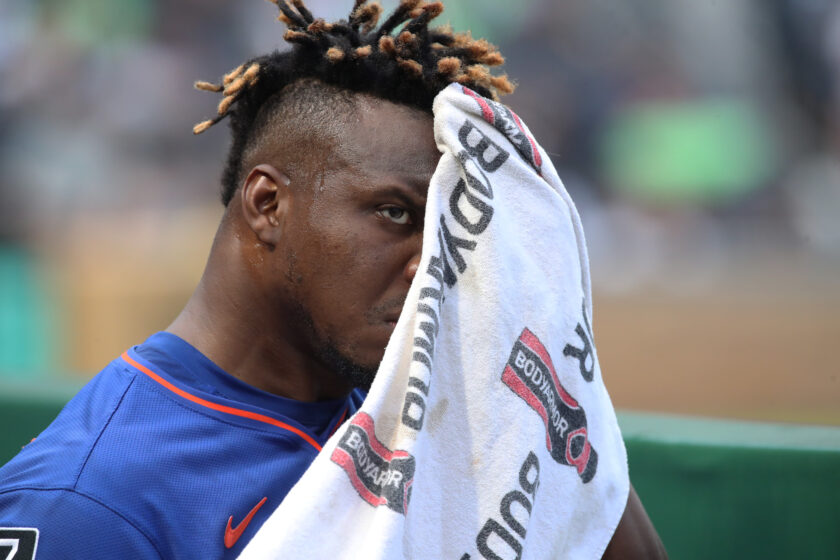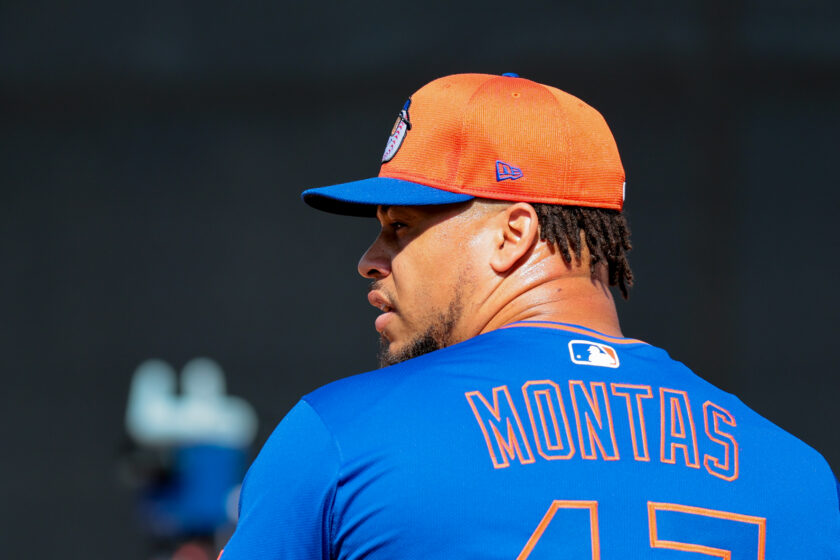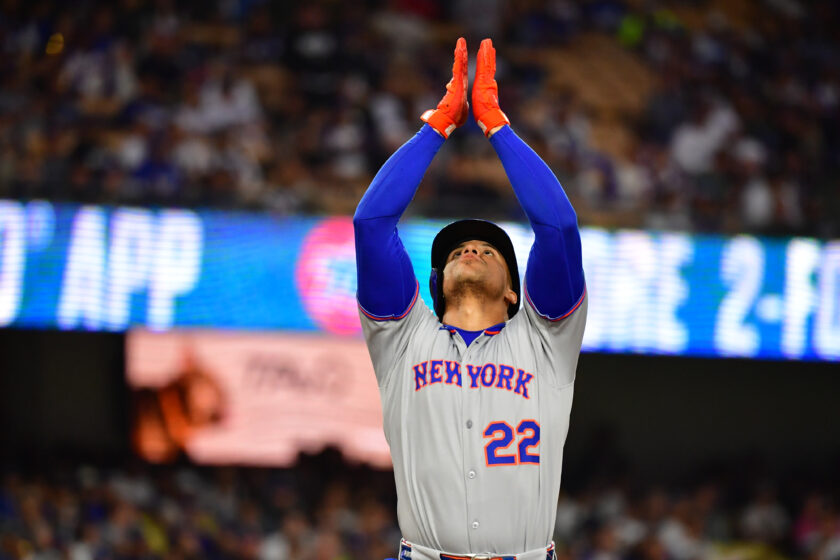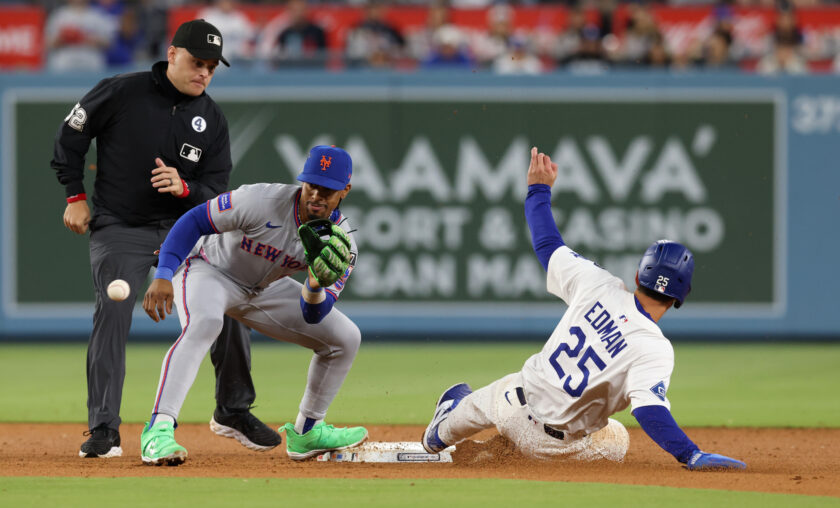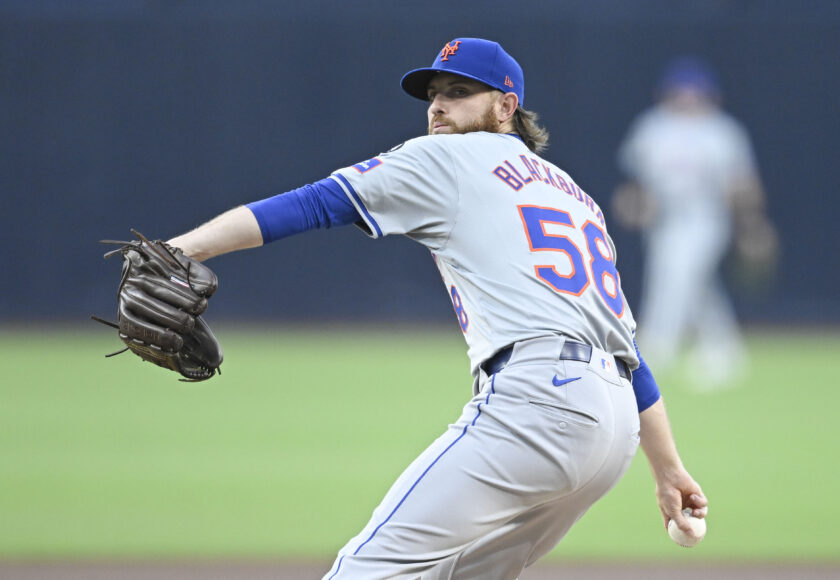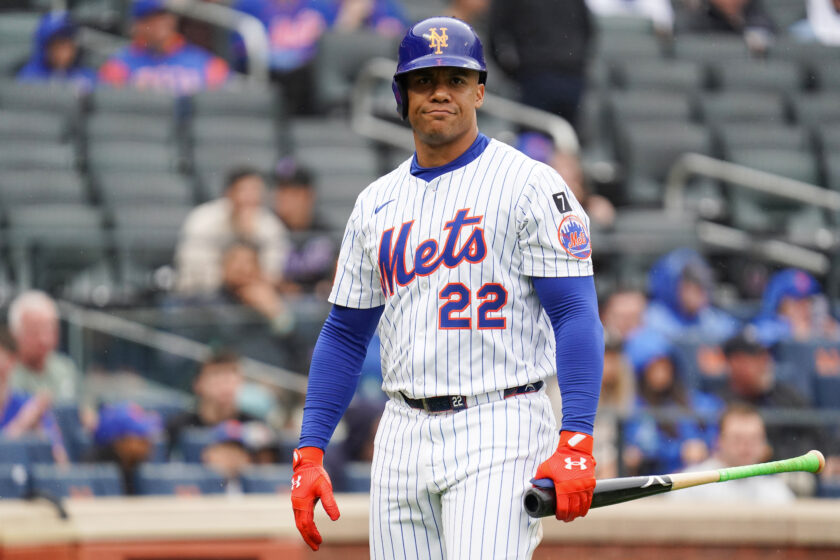New York Mets’ Pete Alonso, NL Rookie of the Year: Where does he stand?
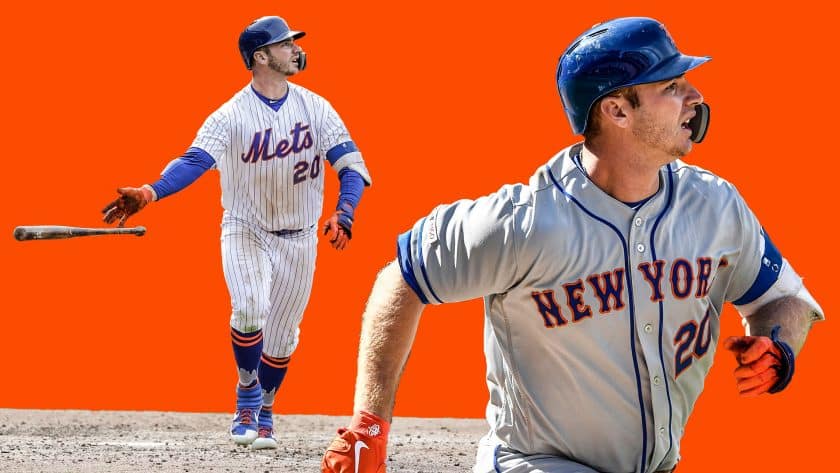
Pete Alonso is having one of the greatest years a New York Mets hitter has ever had. Is that enough to win the NL Rookie of the Year in an extremely competitive field?
The 2019 NL rookie class is incredibly stacked. There are four rookies in the NL who are on pace to be worth more than four FWAR this year. That’s just flat out absurd, in the last five years combined there have only been four rookies who were worth four FWAR or more, Matt Duffy, Kris Bryant, Corey Seager and Cody Bellinger. This year, Bryan Reynolds, Mike Soroka, Fernando Taits Jr. and New York Mets sensational rookie Pete Alonso are all on pace for that kind of a season.
This is one of the greatest Rookie of the Year races in recent memory due to the stacked field. Each player brings something that nobody else in the field does and that has voters conflicted over who to vote for.
So, even though Alonso is on pace to shatter the NL rookie home run record, set by Bellinger, he’s still not even close to a lock to be Rookie of the Year. That said, there are still clearly different tiers among the four contenders for the award this year.
4. Outfielder, Bryan Reynolds, Pirates
https://www.youtube.com/watch?v=cNCEyJuR2uk
The Pirates rookie has had a phenomenal season. He’s worth 3 FWAR so far this season and is on pace to be worth 4.1 FWAR. He is the best contact hitter in this group. Reynolds puts the ball in play more than any of the other hitters in this discussion, has the lowest strikeout rate, the highest batting average, and the highest on-base percentage.
Reynolds is hitting .338/.412/.542. He’s leading the NL in batting average this season. No rookie has ever won the NL batting title. The only rookie to ever win a batting title was Ichiro Suzuki in 2001. Despite possibly doing something no NL rookie has ever done Reynolds is still the clear fourth place among these rookies.
There are a couple of reasons that Reynolds is in fourth place. The first is his lack of power compared to the other rookies. Reynolds has hit only 13 home runs this year and 40 extra-base hits in total. Compare that to Alonso who has 63 extra-base hits, and Tatis Jr. who has 41 extra-base hits, but 22 home runs and you can see how he’s lagging behind. Normally his contact ability would be able to make up for his lack of power, but there is one other major reason holds him back.
Reynolds is a poor defender. One of the biggest changes to the way the media, fans, and the MLB has had in recent years is the focus on defense. Reynolds has been worth -2.4 fielding runs above average this year while playing an import defensive position. That harms his team and his value in ways that don’t affect Tatis Jr. and Alonso.
Reynolds is having a fantastic season, and if this was any other year, he would be in a much better position to be Rookie of the Year, maybe even a lock. Unfortunately, he’s in this class and his lack of power and his poor defense create enough separation between him and the rest of the field that he is currently in a clear cut fourth place.
3. Starting Pitcher, Mike Soroka, Braves
https://www.youtube.com/watch?v=t7fXO00HSHU
Soroka is the top rookie pitcher this year. He has had a potential Cy Young caliber year, too bad for him Hyun-jin Ryu, Jacob deGrom and Max Scherzer are in the NL. That said, Mike Soroka has been worth 3.3 FWAR and is on pace to be worth 4.4 FWAR. He leads all NL rookie starting pitchers in ERA, FIP, XFIP and HR/9.
Soroka has been the ace of the Braves staff in 2019, and deservedly so. He is in Cy Young contention, though he is far behind the leaders of that race. Still, he is the best rookie pitcher and deserves to have his name mentioned in this list because of it. His sparkling 2.32 ERA is proof of how dominant he has been in a year in which offense has taken off like never before. That deserves praise, but there are weaknesses in his game.
Soroka has great control walking only just over two batters per nine innings, but he doesn’t strike batters out. One of the easiest ways to see how dominant a pitcher has been is to look at their strikeout numbers, and Soroka’s are underwhelming, to say the least. He has only struck out just over seven batters per nine. That doesn’t mean he’s been pitching poorly, but it does show how reliant he has been on his defense.
[sc name=”Mets Center” ]Soroka specializes in limiting hard contact and forcing soft contact. The fact he’s able to that shows how great of a pitcher he is, but it also shows that he isn’t a dominant pitcher. The Braves had the greatest version of that pitching archetype in Greg Maddux. Soroka isn’t Maddux, but that is the idea that he follows with his style.
Soroka is a great pitcher, and one to watch for years to come. He just isn’t likely to win the Rookie of the Year. One major reason outside of statistics for that is that voters simply don’t like giving an award that can go to hitters to pitchers. They simply impact the game less than an elite hitter does. Soroka has started 21 games this year, compare that to the 96 games that Reynolds played, the 84 games that Tatis Jr. has played, or the 118 games that Alonso has played. It’s easy to see why voters who be reluctant to give this award to a player who has played in four to five times fewer games than the other competitors.
2. Shortstop, Fernando Tatis Jr., Padres

Tatis Jr. is right on Alonso’s heels in this race. In MLB.com’s latest rookie of the year voting, Tatis Jr. actually garnered more first-place votes. Alonso was still the leader in the race due to a good deal of second-place votes versus Tatis who garnered more third-place votes. Still, that poll is just another indication that Tatis Jr. is right there with Alonso in the race.
Tatis Jr. is hitting .317/.379/.590 this season with 22 HR and 16 SB. He is going to be a 20-20 guy his rookie year, coupled with a likely top-five finish in batting average. He’s worth 3.7 FWAR so far this year and is on pace to be worth five FWAR. That’s an insanely good rookie year.
All of that said there are troubling signs with Tatis that these voters seem to be ignoring. First off is Tatis Jr. insane BABIP. Tatis Jr. is hitting .410 on balls in play, that’s second in the NL. The top hitters in the NL, Bellinger and Yelich only hit .308 and .349 respectively on balls in play. Pete Alonso only has a .278 BABIP. That is a huge sign that Tatis Jr. is in line for major regression as the season goes on.
The same can be said for his plate discipline. Much has been made about Alonso’s strikeout issues this year, but nobody talks about Tatis Jr.’s issues with them. Alonso has an 11.2% walk rate and a 26.3% strikeout rate, Tatis Jr., on the other hand, has an 8.1% walk rate and an insanely high 29.6% strikeout rate.
Lastly, Tatis Jr. has an issue with his contact rates. Tatis Jr. has a 21.6% soft contact rate, that’s the fourth-highest in the NL. Meanwhile, his hard-hit rate of 41.9% is 34th in the NL. That means that he is getting incredibly lucky so far into his rookie season.
Make no mistake about it, the 20-year-old rookie is a special talent. He is electrifying and will be a star in the league for years to come. That said there are major red flags that say his production is simply not sustainable. The fact that the media all of a sudden sees Tatis Jr. as comparable to Alonso is absurd, and they may be blinded by the age at which he’s doing all of this. Simply put, Tatis Jr.’s production is the result of some insane luck to this point, while Alonso has simply been dominant. Their rookie years are not as close as the media is making them seem.
T1. First Base, Pete Alonso, Mets

The New York Mets superstar, rookie Pete Alonso, still tops the list by any statistical measure. Alonso leads all NL rookies in FWAR with 3.8 and is on pace for 5.2 FWAR. Only Corey Seager and Kris Bryant have been worth more FWAR during their rookie years in the last five seasons. Alonso leads all NL rookies in HRs, RBIs, Runs, and hits. His 38 home runs are the second-most by a rookie in the history of the NL. Only Cody Bellinger and his 39 are ahead of Alonso. Alonso is on pace to hit 52 home runs, which would tie Aaron Judge for the all-time rookie record.
Believe it or not, Pete Alonso also leads the NL Rookie of the Year contenders in fielding runs above average with 3.6. Alonso leads the Rookie of the Year candidates in soft-contact rate, making soft contact only 14.5% of the time. He leads all NL rookies in extra-base hits by far with 63. The next closest is Carson Kelly of the Diamondbacks with 42.
The statistical arguments that can be made against Pete Alonso for rookie of the year are simply too limited to be worth consideration. He is far and away the best rookie in the NL this year. Still, two things work against Pete Alonso with voters.
Firstly, Alonso doesn’t play a premium defensive position and Tatis Jr. does. That might not mean a lot to fans, but it does to voters. Despite the numbers not liking Tatis Jr.’s defensive the highlight-reel plays he puts up and the fact he plays SS is a big deal. It is arguably the single most important position in baseball and that means a lot to voters.
Secondly, most of the voters are not very analytically adept. They use stats like OPS, WAR, DRS and other stats of that ilk, but those are flawed tools. WAR varies from site to site. Fangraphs has Alonso at 3.8 to Tatis Jr.’s 3.7, and Baseball-Reference has Alonso at 3.7 and Tatis Jr. at 4.2. Most voters will use the Baseball-Reference version because that is what ESPN uses, but Fangraphs has long been known to have the more representative version of the stat for years.
OPS is a great stat and it does favor Tatis Jr., but it also overestimates his power due to his incredibly high BABIP. Instead, ISO is a much more representative stat when comparing a player’s power, and that heavily favors Alonso.
Lastly, DRS is an impressive tool, but it is also the least representative defense stat tool. Baseball prospectus has even gone away from using their defensive runs above average stat that was based heavily on DRS because they felt it wasn’t truly representative of a player’s defensive abilities. Instead, they have moved to fielding runs above average, which takes into account the pitcher on the mound, the number of plays that player is in on, and more. Again DRS heavily favors Tatis, but FRAA heavily favors Alonso.
While Alonso is clearly the superior player this year to anyone with knowledge of advanced analytics and how to read them, that isn’t the case for most of these writers. That is why the Rookie of the Year race is as tight as it is in the NL. Tatis Jr. is a human highlight reel and that helps him out with the voters.
None of this will likely matter is Alonso goes out and breaks Judge’s rookie home run record. Unless that happens, or Tatis Jr.’s numbers regress to the mean as his advanced analytics suggest they should it will be a tight race. Don’t be surprised if come the end of the season Alonso is robbed of the Rookie of the Year.
[sc name=”Mets Link Next” link=”https://elitesportsny.com/2019/08/14/new-york-mets-news-jeff-mcneils-mri-reveals-mild-hamstring-strain/” text=”Jeff McNeil’s MRI Reveals A Mild Hamstring Strain” ]A contributor here at elitesportsny.com. I'm a former graduate student at Loyola University Chicago here I earned my MA in History. I'm an avid Mets, Jets, Knicks, and Rangers fan. I am also a prodigious prospect nerd and do in-depth statistical analysis.

